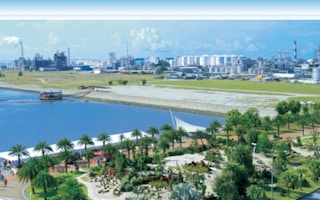China Huaneng-owned Tuas Power (TP) expects to decide ‘sometime this year’ on embarking on Phase 2 of its $2 billion clean coal/ biomass multi-utilities facility on Jurong Island, TP’s president and chief executive Lim Kong Puay told BT yesterday.
This is because a ‘substantial portion’ of the steam and power output from Phase 1 of the Tuas Multi-Utilities Complex (TMUC) - currently under construction - has already been committed to new petrochemical customers there, he disclosed.
They include Germany’s Lanxess and Taiwan’s Dairen Chemicals, each of which is building mega $500 million to $700 million plants there, with TP currently talking to ‘a few others’, Mr Lim added.
The genco embarked on Phase 1 of TMUC - producing 200 tonnes of steam per hour and 100 megawatts of power - in late-2009, and expects to start supplying customers with utilities like steam from the second half of next year.
Both Lanxess, which is building a state-of-the-art $680 million synthetic rubber plant here, and Dairen, which is investing $500 million in three chemicals plants on the island, have targeted start-ups in the first quarter of 2013.
In total, TP is targeting its TMUC project to provide ‘one-stop, third-party utility services to the wide-range needs of approximately 15 petrochemical customers in the surrounding area’, the genco revealed in its latest tender, called last Friday, for an EPC contractor to provide the utilities piping connecting TMUC to its new customers.
TMUC is being developed concurrently on two sites about 2 km apart on Jurong Island, the tender showed.
The 14-hectare Site 1 at Tembusu Crescent/Avenue - where the main power and steam will be produced, and including a desalination plant - has sea frontage to allow feed stocks comprising low-ash, low-sulphur coal and tropical biomass, mainly palm kernel, to be shipped in from suppliers including in Indonesia.
Site 2, occupying 8.75 hectares at the island’s Banyan sector, houses plants for demineralised water treatment, waste water treatment and high-grade industrial water.
Lanxess’ contract with TP, for instance, covers the supply of high-grade industrial water and demineralised water, apart from steam.
TMUC has been designed to produce in total 160 MW of power and 1,000 tonnes per hour of steam, with its seawater reverse osmosis plant designed to supply 20 million gallons of water per day.
TP is Singapore’s third largest genco with 2,670 MW of capacity at its main Tuas power station.
The company has been aggressively expanding beyond power generation to supplying multi-utilities to petrochemical and other industries, like Finland’s Neste Oil which produces renewable bio-diesel at a nearby $1.2 billion Tuas plant.
The genco is also spending another $470 million to ‘repower’ the first of two older, steam plants at its Tuas station into a more efficient combined cycle gas turbine plant, making this its fifth CCGT.








